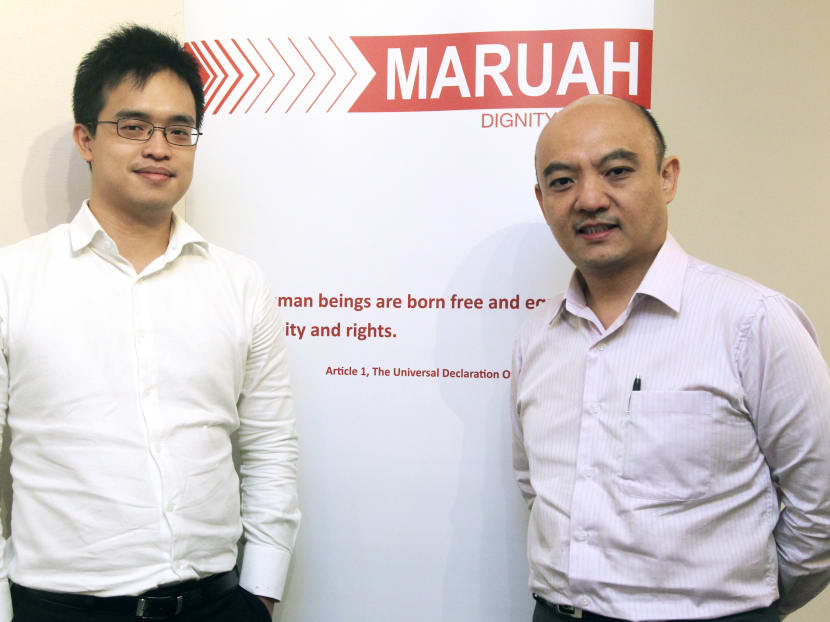Group urges more transparency in drawing electoral boundaries
SINGAPORE — In five General Elections, an area in Kaki Bukit bounded by the Pan-Island Expressway, Bedok North Road and Bedok North Avenue 3 has been part of four constituencies — split between the Aljunied and Eunos Group Representation Constituencies in 1988, absorbed into East Coast GRC in 1997, moved to Marine Parade GRC in 2006 and back to Aljunied GRC in 2011.

Mr Kao Zi Jian (left) and Mr Ngiam Shih Tung at media conference held by MARUAH, a Singapore-based Human Rights NGO, to discuss its latest research findings on the Singapore election system, as part of its ongoing project, Defending the Legitimacy of Singapore Elections, Oct 9, 2014. Photo: Ooi Boon Keong
SINGAPORE — In five General Elections, an area in Kaki Bukit bounded by the Pan-Island Expressway, Bedok North Road and Bedok North Avenue 3 has been part of four constituencies — split between the Aljunied and Eunos Group Representation Constituencies in 1988, absorbed into East Coast GRC in 1997, moved to Marine Parade GRC in 2006 and back to Aljunied GRC in 2011.
Highlighting its “frequent boundary changes”, human rights group Maruah yesterday called for more transparent deliberations by the committee that reviews electoral boundaries and for polling data at the precinct level to be made known.
Arbitrary and unnecessary electoral boundary changes breed cynicism about the political process and weaken the relationship between citizens and their elected representatives, Maruah argued in one of two position papers released.
“It is Maruah’s view that Singapore’s present electoral boundary delimitation system does not fully meet the fundamental principles of impartiality, equality, representativeness, non-discrimination and transparency,” it stated in the position paper.
It said the rationale and criteria for determining the number of constituencies should be published and debated in Parliament. Electoral boundaries should be aligned to the Urban Redevelopment Authority’s planning areas as much as possible because they form “natural communities of shared interest”, and this would simplify the provision of municipal services by town councils, it added.
The Electoral Boundaries Review Committee should include laypersons and technical experts such as statisticians, said Maruah member Ngiam Shih Tung, an engineering manager in the aerospace industry, in a press briefing yesterday.
“The decision-making process must be independent and impartial, and appear to be so,” said Mr Ngiam, 47.
The papers presented yesterday are part of Maruah’s ongoing project called Defending the Legitimacy of Singapore Elections. They will be submitted to the Elections Department — as was done with its two previous papers on citizens’ confidence in the secrecy of the ballot and what the group considered were areas for reform in the GRC system, said Maruah president Braema Mathi.
Some of the issues the group raised have been voiced by others. In 2010, then Non-Constituency Member of Parliament Sylvia Lim of the Workers’ Party had questioned the 30 per cent variation allowed, from the average number of voters per MP, in constituencies.
In response, then Deputy Prime Minister Wong Kan Seng said the 30 per cent variation, used by the committee in deciding the size of a constituency, was a practice carried out over the past 30 years. “Before that, the number was smaller, but the committee needs to have a certain way and a certain principle of guiding themselves on determining the size of the constituency,” he had said.
Mr Wong also said the Prime Minister has full discretion in determining the number and boundaries of electoral divisions, but “has always appointed the Electoral Boundaries Review Committee before every General Election”.
In its other position paper on Community Development Councils (CDC), Maruah called for mayors to be popularly elected and for the dissolution of “existing CDCs in their current political form”. The non-elected nature of the CDCs and mayors means that Singaporeans are deprived of their right to have a say in how their CDC is operated, said Maruah member Kao Zi Jian, a 28-year-old civil servant.
Said Ms Mathi: “We are trying to make our whole approach more open, more transparent and more inclusive of the diversity that Singapore is going through. And it’s also a step forward to embrace a political system that hopefully will become more and more democratic.”






